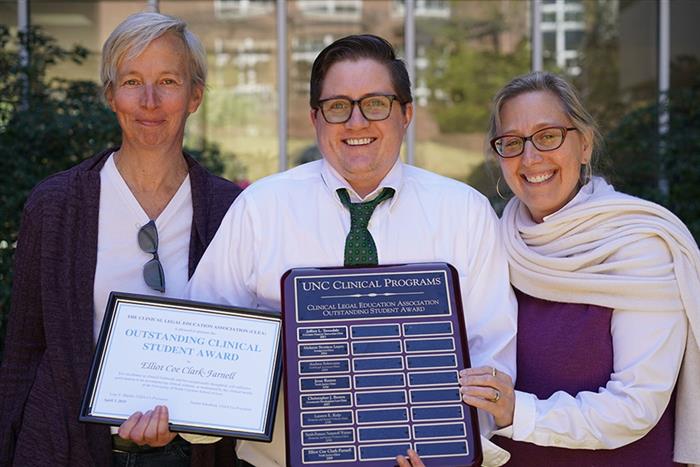Elliot Clark-Farnell 3L Wins Clinic Outstanding Student Award
April 3, 2019
Elliot Clark-Farnell 3L received the annual Clinical Legal Education Association (CLEA) Outstanding Student Award in April for his work in the Youth Justice Clinic during the 2018-19 school year. CLEA is the primary national organization dedicated to clinical education in law schools across the country, and the award honors one student or student team at each law school who has excelled in a clinical course.
Clark-Farnell was a student in the Youth Justice Clinic, in which law students represent children accused of crimes in delinquency and undisciplined proceedings. They also represent children in school discipline proceedings and work on related juvenile justice projects.
Clark-Farnell primarily focused on representing a young man accused of a series of property crimes in Orange County, N.C. He investigated the facts of the case, prepared several pre-trial motions, argued on the client’s behalf at pre-trial hearings, engaged in negotiations with the prosecutor and court counselors, and worked extensively with the client’s mother on arriving at a resolution.
“Elliot exemplifies the skills and habits of mind that we teach in the clinic – excellent legal analytical ability, strong interviewing and counseling skills, oral and written advocacy skills, and the ability and willingness to be introspective and receive critique about his performance,” says Assistant Professor of Law Barbara A. Fedders, who directs the Youth Justice Clinic.
Clark-Farnell also served as a research assistant to Clinical Associate Professor Beth Posner ’97 last year. He hopes to be a public defender in North Carolina after graduation.
At UNC School of Law, the CLEA Outstanding Student Award recipient is selected based on excellence in clinical work, particularly in development of the attorney-client relationship; in case planning and development; efficiency and reliability in time management; polished oral and written communications; overall significance of casework contributions; and contributions to the clinical community at large.
-April 3, 2019
